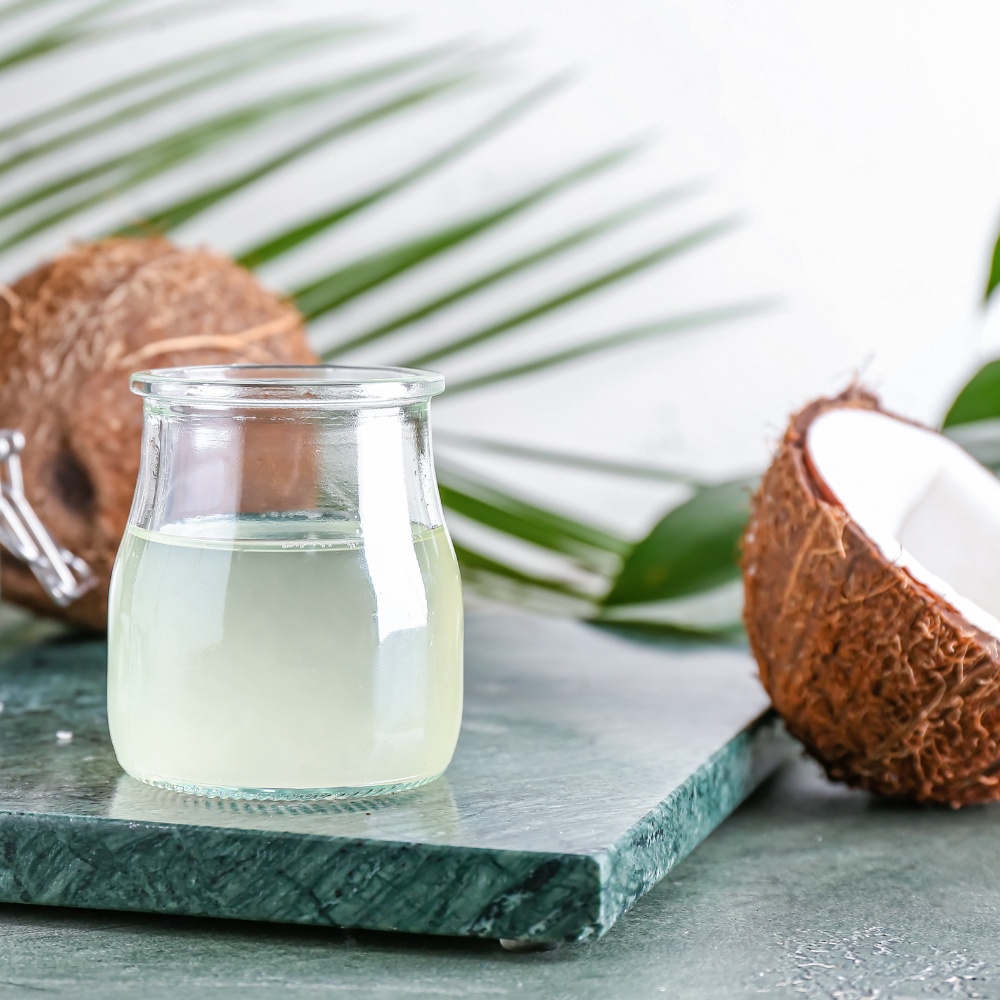In the flavorful world of cooking, your oil choice is the secret hero, transforming meals from ordinary to extraordinary. Picture extra virgin olive oil gracing salads or sesame oil adding an exotic touch to Oriental dishes.
But who comes to the rescue for the versatile Indian cuisine? Meet our dynamic duo - groundnut oil and rice bran oil.
Choosing between these two can feel like a culinary cliffhanger. Do you opt for groundnut oil, with its rich, earthy aroma or rice bran oil, renowned for its high smoke point and light texture?
Let's embark on a quick culinary adventure, diving into the heart of this kitchen showdown. We'll explore their unique health benefits, flavour profiles and why organic, cold-pressed variants are your secret to a healthy lifestyle.
Ready to unravel the comparison of rice bran oil vs groundnut oil? Let's dive into the flavorful face-off between rice bran oil and groundnut oil. Who will emerge as the true kitchen champion?

|
TABLE OF CONTENTS
|
What is Rice Bran Oil?
Before we dive into the section of rice bran oil vs groundnut oil, we must comprehend the basics of these oils. So, let’s start with Rice bran oil.
What is rice bran oil made of?
Rice bran oil is extracted from the outer layer of the rice grain, known as the bran. Similar to groundnut oil, it lacks any distinct flavor, making it compatible with various food tastes.
It contains beneficial compounds like gamma-oryzanol and tocotrienol, which help reduce LDL or "bad" cholesterol levels and increase HDL or "good" cholesterol levels. This makes rice bran oil a healthy choice for promoting heart health.
Rice Bran Oil Nutritional Value per 100 g
According to data provided by the USFDA website, the nutritional profile of 100 grams of Rice bran oil is as follows:
|
Energy |
884 kCal or 3699 kJ |
|
Iron |
0.07 mg |
|
Vitamin E (alpha-tocopherol) |
32.3 mg |
|
Vitamin K (phylloquinone) |
24.7 mcg |
|
Saturated Fatty Acids |
19.7 g |
|
Monounsaturated Fatty Acids (MUFA) |
39.3 g |
|
Polyunsaturated Fatty Acids (PUFA) |
35 g |
|
Phytosterols |
1190 mg |
Let us read about the Rice Bran Oil benefits and side effects
Advantages of Rice Bran Oil
Rice bran oil offers several advantages that make it a popular choice for cooking and other applications.
Here are some of the key advantages of rice bran oil:
- Heart-Healthy: Rice bran oil has cardiovascular benefits. It has a good mix of saturated, monounsaturated, and polyunsaturated fats. It's heart-healthy because it's low in trans fats and cholesterol.
- High Smoke Point: Its high smoke point is one of the benefits of rice bran oil's benefits. It can resist temperatures up to 450°F (232°C) without breaking down or emitting toxic fumes. This allows for deep-frying, stir-frying, sautéing, and grilling.
- Neutral Flavor: Rice bran oil tastes mild and neutral. It lets dishes' inherent flavours shine through. This makes it a flexible cooking oil for many cuisines
- Rich in Antioxidants: Rice bran oil contains antioxidants like tocopherols, tocotrienols, and gamma-oryzanol. Antioxidants fight free radicals and oxidative stress, which cause disease and aging. Rice bran oil improves health.
- Nutrient-Rich: Rice bran oil contains vitamins, phytosterols, and fatty acids. Antioxidant vitamin E boosts immunity and skin health. Fatty acids and phytosterols reduce cholesterol.
- Long Shelf Life: Rice bran oil lasts longer. Natural antioxidants keep it fresh. It can be stored longer without deteriorating.
Rice bran oil is a nutritious and flexible cooking oil with these benefits. However, consider individual nutritional needs and see a healthcare practitioner or nutritionist for specialised recommendations.
Rice Bran Oil Disadvantages
In spite of several benefits, there are some disadvantages to using Rice Bran Oil, which are as follows:
- May contain trace amounts of allergenic proteins from rice, potentially causing allergies in sensitive individuals.
- Relatively higher in calories compared to some other oils, so portion control is necessary for those watching their calorie intake.
- Some people may find its mild flavour less appealing compared to oils with more distinct tastes.
- May be more expensive compared to other commonly used cooking oils.
- Availability may be limited in certain regions or stores.
What is Groundnut Oil?
Groundnut oil, also known as peanut oil, is a popular cooking oil derived from peanuts (groundnuts). It is extracted from the seeds of the peanut plant through a process of pressing or solvent extraction.
Groundnut oil has a mild taste, high smoke point, and versatility in cooking. It's used in Asian and African cooking for stir-frying, deep-frying, sautéing, and flavouring. Groundnut oil is used to make margarine, dressings, and baked items.
Groundnut Oil Nutritional Value per 100 g
Here's a table showcasing the approximate nutritional values per 100 grams of groundnut oil:
|
Nutrient |
Amount per 100g |
|
Calories |
884 kcal |
|
Total Fat |
100 g |
|
Saturated Fat |
17 g |
|
Monounsaturated Fat |
46 g |
|
Polyunsaturated Fat |
32 g |
|
Omega-3 Fatty Acids |
0.3 g |
|
Omega-6 Fatty Acids |
31.5 g |
|
Cholesterol |
0 mg |
|
Carbohydrates |
0 g |
|
Protein |
0 g |
|
Vitamin E |
15 mg |
|
Phytosterols |
207 mg |
Source: https://www.fatsecret.com/calories-nutrition/usda/peanut-oil?portionid=56940&portionamount=100.000
Advantages of Groundnut Oil
Groundnut oil is popular for cooking due to its benefits. Groundnut oil benefits include:
- Heart-Healthy: Heart-healthy monounsaturated and polyunsaturated fats are balanced in groundnut oil. These fats cut LDL cholesterol and heart disease risk.
- High Smoke Point: Groundnut oil smokes at about 450°F (232°C). It's good for stir-frying and deep-frying. It's heat-resistant and smoke-free.
- Neutral Flavor: Groundnut oil tastes neutral. It lets other ingredients shine by without overpowering recipes. It's versatile and suitable for many dishes.
- Rich in Vitamin E: Groundnut oil contains antioxidant vitamin E. Vitamin E protects against free radicals, improves skin health, and boosts immunity.
- Nutrient-Rich: Groundnut oil contains phytosterols, which decrease cholesterol, and resveratrol, an antioxidant and anti-inflammatory. It contains minor levels of vitamin K, magnesium, and copper.
- Long Shelf Life: Antioxidants in groundnut oil extend its shelf life. Its long shelf life makes it ideal for culinary use.
These benefits make groundnut oil a popular cooking oil, especially in Asian cuisines. However, as with any oil, moderation is key, and individual dietary needs should be considered.
Disadvantages of Groundnut Oil
While groundnut oil offers various advantages, it also has some potential disadvantages to consider. Here are a few of them:
- May cause allergies in individuals with peanut or legume allergies.
- High in calories and fat, so portion control is important for those watching their calorie intake.
- Not suitable for individuals following a strict paleo or ketogenic diet due to its higher carbohydrate content compared to some other oils.
- May have a distinct flavour that some individuals may not prefer in certain dishes.
- Potential for adulteration or quality issues in lower-quality or improperly stored oils.
Rice bran oil vs groundnut oil: Which one to use
When considering Rice bran oil vs groundnut oil, both oils have different benefits. Your needs, preferences, and oil use determine the option.
- Peanut oil, or groundnut oil, is versatile and mild-flavoured. Deep-frying and stir-frying are acceptable because of their high smoke point. Monounsaturated lipids and vitamin E make groundnut oil heart-healthy. Asian cuisines love its flavour.
- Rice bran oil, however, has benefits. Its monounsaturated and polyunsaturated fats make it heart-healthy. Rice bran oil is versatile because of its high smoke point. Its bland flavour complements many cuisines. Antioxidants, phytosterols, and vitamin E make rice bran oil nutritious.
- Consider your cooking methods and flavours to decide. Just like, groundnut oil works well in Asian dishes and has a softer flavour. Rice bran oil has a neutral taste and several nutrients.
- Both oils are heavy in calories, so use them sparingly. Individual diets should also be considered. If you are confused, consult a doctor or nutritionist for tailored guidance.
All-in-all, In the battle of rice bran oil vs groundnut oil, both oils have their unique qualities, enhancing Indian cuisine in their own way.
FAQs
Is rice bran oil suitable for individuals with peanut allergies?
Rice bran oil does not contain peanuts or peanut proteins. Hence it is suitable for peanut allergy sufferers.
Can I use groundnut oil for baking and salad dressings?
Yes, Groundnut oil can be used for baking; however, its flavour may not suit delicate baked items. Groundnut oil can dominate other elements in salad dressings, so use olive or avocado oil instead.
Which oil is better rice bran or groundnut oil?
Both rice bran oil and groundnut oil offer health benefits. Rice bran oil is rich in antioxidants and vitamin E, while groundnut oil is a good source of monounsaturated fats. The choice between them depends on individual dietary needs and preferences.
Can I reuse rice bran oil and groundnut oil for frying?
Both rice bran oil and groundnut oil can be reused for frying, but it's important to strain and store them properly. Monitor the oil's quality, discard if it becomes dark or develops a rancid smell, and avoid reusing excessively used or burnt oil.
Are rice bran oil and groundnut oil suitable for a low-fat diet?
Rice bran and groundnut oils are heavy in fat and calories, making them unsuitable for low-fat diets. However, moderate quantities in a balanced diet can provide nutrition and flavour.
Is rice bran oil good for health?
Indeed, rice grain oil is viewed as a sound decision. It's low in soaked fats, has a high smoke point, and contains valuable mixtures like cell reinforcements and vitamin E, which can add to heart well-being.
Conclusion
In the epic culinary duel between rice bran oil and groundnut oil, there's no absolute winner.
Both oils bring unique nutritional profiles and cooking features to the table. Groundnut oil's mild flavour and high smoke point make it a versatile choice, while rice bran oil's heart-health benefits and antioxidants place it high on the nutritional scale.
Deciding on the champion boils down to individual dietary needs, taste preferences, and cooking styles. Stay open to experimenting and find your perfect oil, mate.
Switch to healthier cooking by choosing organic, cold-pressed groundnut oil from Two Brothers Organic Farms. Shop now and taste the difference!
READ MORE :
Which Oil Is Best for Indian Cooking? - A Comprehensive Guide for Better Health
Palm Oil Vs Coconut Oil Vs Olive Oil - Which One is the Best?










